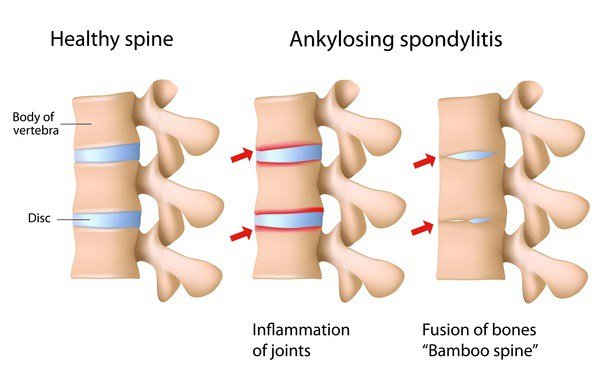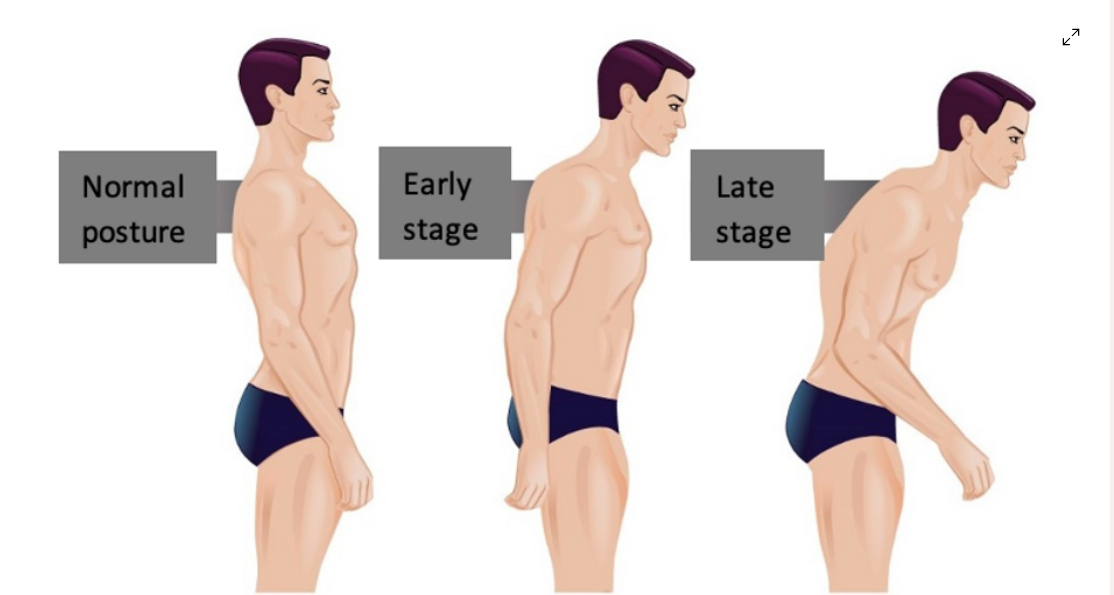Doctor, I have Ankylosing Spondylitis !!
Doctor, What is Ankylosing Spondylitis (AS)?
Ankylosing Spondylitis is a type of arthritis that primarily affects the spine. It causes inflammation in the joints between the vertebrae, leading to back pain and stiffness. Over time, the inflammation can cause the vertebrae to fuse together. And hence the name Bamboo Spine.

Who is at risk of developing Ankylosing Spondylitis?
AS tends to appear in early adulthood, often striking individuals between the ages of 17 and 45. It is more common in men than in women, and genetics play a significant role. If someone in your family has AS, you may have a higher risk (3 percent more than the general population).
And now you know why if you are young and you have back pain you shouldn't Neglect.
Doctor, am I alone with this disease?
No, the latest study done in India shows that 16.5 lakh Indians are currently suffering from AS. And if you are under proper treatment you will never feel a pain.
What are the signs and symptoms of Ankylosing Spondylitis?
- Early symptoms include persistent lower back pain and stiffness, especially in the morning after you get up from bed. or after periods of inactivity.
- Alternate Buttock Pain ( Some day Pain in Right Buttock and Someday in Left)
- Fatigue (i.e. easily you get tired).
- Neck pain ( Yes, only Neck Pain May be the only symptom you have)
- Hip Pain ( Pain in Groin Region).
- Sometimes a Single finger may get Swollen (Dactylitis).
- Generally Pain occurs in Large weight Bearing Joints ( Remember in Rheumatoid Arthritis it was the Small joints of the finger that were affected most)
In Late Stages or if not diagnosed early.
- There may be Eye Redness with itching ( though occasionally seen early also).
- Problems in breathing because of the heart or Lungs getting Involved.
- Decreased bone strength due to Osteoporosis.
- Skin Problems like Rashes or Nodules.
- You may Permanently bend forward.

Doctor, How is Ankylosing Spondylitis Diagnosed?
To diagnose your Doctor will Take the History ( Generally Morning Pain in the Back is the Main clue). Followed by some Examinations, Like asking to Bend forward, measuring your chest expansion and giving pressure over your Sacro-iliac joint (The Main Culprit)
Some blood tests ( CBC CRP HLA B27 ) and Xray/ MRI may be given to confirm the Diagnosis !!
Can Ankylosing Spondylitis be cured?
Currently, there is no cure for AS, but various treatments can help manage symptoms and improve the quality of life for those affected. Early diagnosis and proper management are essential for better outcomes.
If my parents have this disease will I have it too?
Sadly, the answers are quite complex. Ankylosing Spondylitis is not considered a hereditary disease. If your 1st-degree relative ( Mother, father, siblings) has this disease you are Three times more likely to have this disease than people with no family history.
What are the treatment options for Ankylosing Spondylitis?
Though the disease is yet to be said as curable but there are a lot of medicines available that, if taken properly will keep you pain-free for a long duration of time and even stop the progression of the disease. Let's divide the treatment into Medical and Non-Medical Parts.
Medicinal Treatment:
The treatment protocol followed is almost the same worldwide. Initially, your doctor will put you on some Painkiller drugs (Called NSAIDs), and Depending on your condition may add Steroids for the short term ( Yes Steroids!!, Explained later).
He will also put you on Special Drugs called DMARDs ( Disease Modifying Anti Rheumatoid arthritis Drugs). These drugs take time to start their action and are quite effective if started early ( May even halt the disease permanently as per the latest research).
Depending on your response and the outcome of some blood tests the doses of these drugs are increased on subsequent visits.
.If the Pain is still not reduced, there are some more powerful medicines called Biologics that may be added.
Is there a Role for Injections?
Yes, Since in this disease mainly joints are involved so Joint specific injections are given often. Sometimes, the Biologics are also given not as a tablet but as Injections depending on Disease activity.
My doctor gave me a lot of Blood tests, are they really Needed?
This is really an issue, we must understand clearly.Blood tests can be divided into three categories:
- Helps in diagnosing the disease: Tests then CBC, CRP and HLAB27 helps us to know if you really are suffering from it.
- Helps in Knowing How much disease will progress: Presence of HLAB27 in the blood helps not only in diagnosis but also to know how much the disease may progress.
- Helps in Knowing side-effects or Progression of the disease: ESR, and CRP Reports says us how much disease is in an active state in the body. Then Blood parameters like LFT, Ur, and Cr helps in Knowing if the drugs are causing damage to your Liver or Kidney. Then Blood Parameters like CBC help to know Hemoglobin status.
So, now you know how important these tests are. And hence these tests should be done from Reputed Labs ONLY !!
And what about other Investigations?
MRI: One of the best way to diagnose the disease at the earliest possible time.
CT Scan of Chest: It helps in knowing the status of your Lungs. And in Patients with this disease for greater than 10 years it may be given if your doctor suspects the involvement of Lungs.
Steroids, Pain Killers, and then these Strong Medicines, What about Side-effects?
Almost no medicine is Free from side effects!! Even the foods you eat have Side-Effects.
Diseases like Ankylosing Spondylitis not only cause tremendous joint pain, it silently damages all vital organs like the Heart, Lungs, and Kidneys.
Hence all these medicines are very important in preventing these.
The Medicines should not be stopped until and unless asked by your treating Doctors.
The side effects are routinely followed by your doctors and the dose of medicine is adjusted on a regular basis keeping in mind the side effects.
Regarding the much talked about Steroids, it's recently said, that patients who were started on steroids early had a much better outcome and often most patients lived a long life completely disease-free ( We call it, the Remission stage).
Most medications decrease the power of your immune system so that it doesn't attack the healthy tissues of your body. (So you know how important these drugs are)
Many times, pain doesn't decrease on Medications, and without any visible effect, patients tend to stop the Medicines, without realizing the harm as the medicines also work in keeping your Heart and other Vital organs safe and prevent joint deformities.
How does exercise benefit individuals with Ankylosing Spondylitis?
Regular exercise helps manage symptoms by improving flexibility and posture, reducing pain, and slowing down the progression of the disease.
Activities like swimming, walking, and yoga are often recommended.
Breathing Exercise greatly helps your Lungs.
To see Details on Exercise Click Here
Can diet play a role in managing Ankylosing Spondylitis?
While there's no specific AS diet, maintaining a healthy and balanced diet is important.
Some people find relief by avoiding certain foods that may trigger inflammation, but individual responses vary.
It's advisable to consult with a healthcare professional or a registered dietitian.
To know more click here
What complications can arise from Ankylosing Spondylitis?
If not properly managed, AS can lead to complications such as spinal fusion, which limits mobility. Eye inflammation (uveitis), heart problems, and lung issues may also occur. Regular check-ups and early intervention can help prevent or manage these complications.
How can someone cope with the emotional impact of Ankylosing Spondylitis?
Living with a chronic condition can be challenging emotionally. Joining support groups, seeking counseling, and staying connected with friends and family can provide emotional support. It's essential to communicate openly with healthcare providers about any emotional struggles.
Is pregnancy safe for individuals with Ankylosing Spondylitis?
With proper medical guidance, many individuals with AS can have successful pregnancies. Planning and monitoring by a healthcare team are crucial to ensure a healthy pregnancy and manage any potential complications.
Can Ankylosing Spondylitis be prevented?
Since genetics play a role, preventing AS entirely may not be possible. However, early diagnosis, prompt treatment, and a healthy lifestyle can help manage the condition effectively and improve overall well-being.
In conclusion, Ankylosing Spondylitis is a challenging condition, but with the right medical care, lifestyle adjustments, and emotional support, individuals can lead fulfilling lives.
Early detection and proactive management are key to minimizing the impact of this chronic inflammatory arthritis.
If you suspect you may have AS, don't hesitate to consult with a healthcare professional for proper evaluation and guidance.